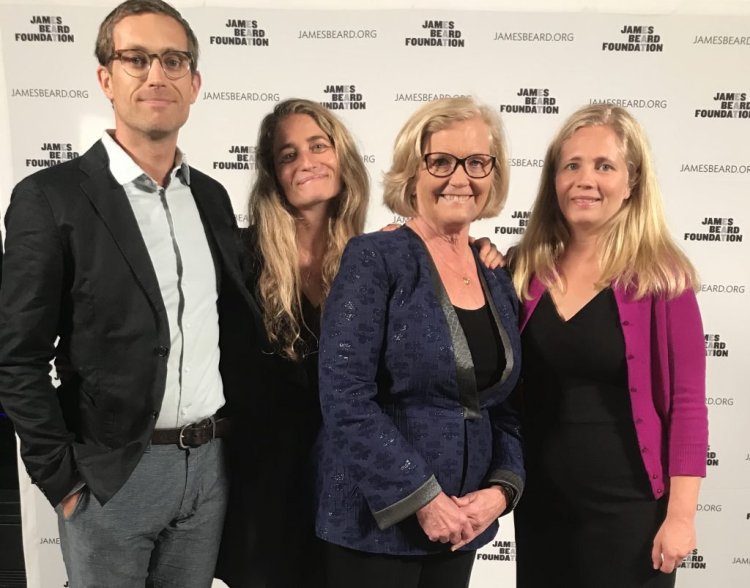The James Beard Foundation on Monday night awarded U.S. Rep. Chellie Pingree one of its Leadership Awards during the organization’s annual food summit in New York City.
Pingree, a Democrat who represents Maine’s 1st Congressional District, was also one of the summit’s keynote speakers. Her topic: how consumer demand for local, organic food is shaping food policy in Washington, D.C.
The eighth annual leadership awards recognize a broad range of people who influence how, why and what Americans eat. Past winners have included chefs, food writers, professors and food activists, but Susan Ungaro, president of the James Beard Foundation, said it’s less usual for a politician to be a recipient. Rep. Jim McGovern, a Democrat from Massachusetts, won last year for his work fighting hunger, and Michelle Obama won in 2011 for her campaign against childhood obesity.
Pingree’s award, Ungaro said in a phone interview from the food summit, “really signifies the fact that she is not your typical politician. She really walks the talk.”
Ungaro cited the fact that Pingree owns her own farm (on North Haven island) and has supported legislation that promotes healthy food, the organic food industry, and local and regional food systems. Pingree, she said, “really stands out as a politician who is bringing her own personal passion in terms of helping our agriculture systems be more organic and fresher, and to make the soil stand out as just as important as oil.”
In her remarks Monday afternoon, Pingree said that although consumers want more sustainable farming practices and greater transparency about what’s in their food, American food policy is still stuck in “the Earl Butz era” of the 1960s and 1970s, favoring commodity crops and industrial agriculture. “We incentivize all the wrong things,” she said.
Butz, secretary of agriculture under Presidents Nixon and Ford, urged American farmers to grow more corn and “get big or get out.” Pingree, who sits on the House Appropriations Committee’s agriculture subcommittee, cited a new report on consumer trends just released by the James Beard Foundation that shows that 67 percent of consumers changed their diets within the last three years, trending toward healthier foods. More than three quarters of those surveyed said they want to know where their food comes from, and more about the environmental impact of bringing their meals from the farm to the plate.
Pingree said that mirrors changes she’s seen in her 45 years as a farmer, activist and policymaker. When she first started farming, people shopped at her farm stand “but virtually nobody said, ‘Is it organically grown?’ ”
Now, she said, “They want to know what the pigs had for lunch today. They want to know what the view is like for the chickens.”
Pingree said the widespread public interest in sustainable farming practices and increased transparency in the food industry crosses all ages and economic status – and party lines, noting that she has more Republican co-sponsors for her bills than ever before.
Pingree is sponsoring the Organic Agriculture Research Act, which would more than double the amount of U.S. Department of Agriculture funds going into organic research. Although the market for organic foods has doubled in the last decade, she said, the amount of money dedicated to research is still one-tenth of 1 percent of the entire USDA budget.
“You shouldn’t tell a farmer … just go do it like they did it in the 1800s,” she said.
Pingree is also sponsoring the Food Recovery Act, which would reduce food waste, and the Local Farms Act, which would help low-income consumers and veterans buy CSA shares, give schools more flexibility to buy local foods, and launch a pilot produce prescription program for consumers who want to use food as medicine.
Pingree said it was a breakdown in trust between consumers and food companies that led to the controversial food labeling campaigns for bovine growth hormone and genetically modified organisms, also known as GMOs. Consumers, she said, are now more engaged “and they’re not going to take it anymore.” Companies and policymakers are starting to hear them, she said.
“Sometimes it’s just better to respect the consumer and say there’s a reason they want to know what’s in their food,” Pingree said.
Other recipients of this year’s leadership awards are chef Dan Barber for his work eliminating food waste; Olivier De Schutter, co-chair of the International Panel of Experts on Sustainable Food Systems; Joan Dye Gussow, a professor, author, food policy expert and environmentalist; and Joann Lo and Jose Oliva, co-directors of the Food Chain Workers Alliance, which strives to improve the lives of food system workers.
Eliot Coleman, a Maine organic farmer and author, won the award in 2015 for his 40 years of work developing innovative organic farming techniques and educating people about organic agriculture.
Meredith Goad can be contacted at 791-6332 or at:
mgoad@pressherald.com
Twitter: MeredithGoad
Send questions/comments to the editors.



